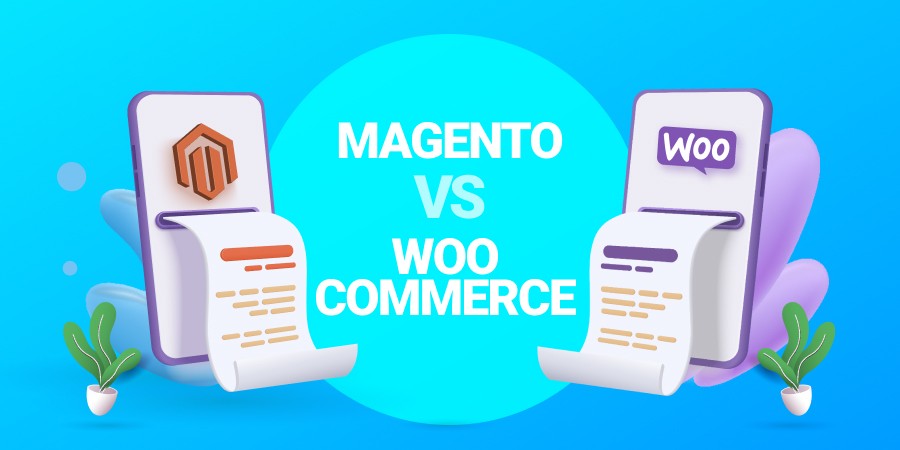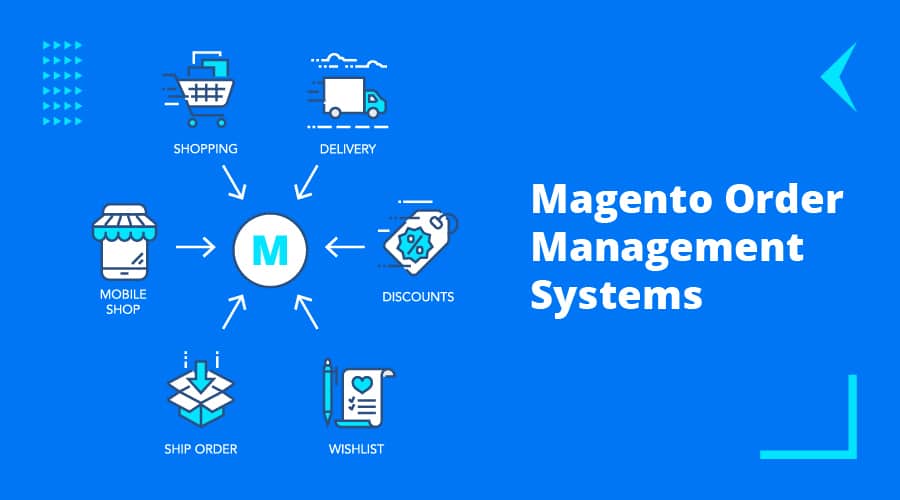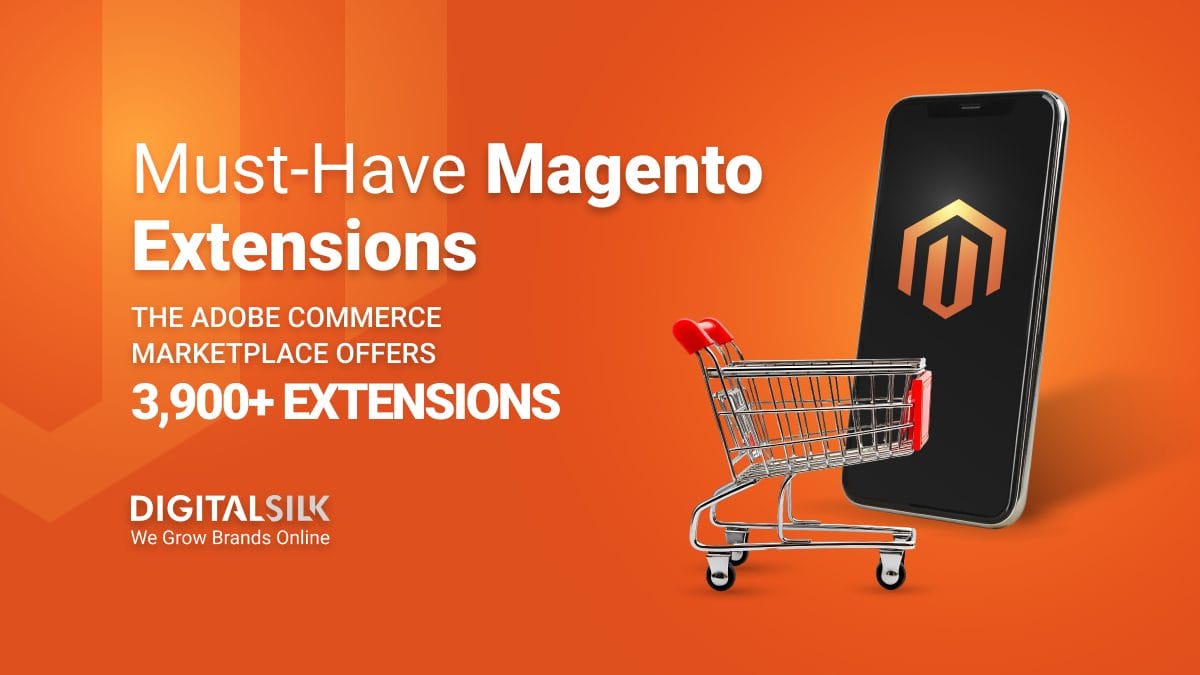While you can create a more customized eCommerce website that has built-in SEO features with Magento (now Adobe Commerce), the platform’s high prices might make you think of opting for a more affordable option.
Enter Shopify: an eCommerce platform that doesn’t offer as many built-in SEO features, but is more cost-effective than Magento.
Choosing between Magento and Shopify requires you to prioritize needs for your eCommerce store.
Is budget your main concern? Or maybe it’s customization, support or security? Both platforms offer pros and cons that make them suitable rivals, which leaves us with the question: Which one pays off in the long run?
It’s the battle of the two top eCommerce platforms: Magento vs. Shopify.
In this article, we’ll compare Magento and Shopify in terms of pricing, functionality, and other key factors. Plus, we’ll share platform recommendations from our experts at Digital Silk.
Digital Silk builds custom e-stores. Request a quote
Magento (Adobe Commerce) At A Glance
Magento, now Adobe Commerce, is an open-source eCommerce platform. It was released on March 31, 2008 and was acquired by Adobe in 2018.
As an open-source platform, the user has full access to the source codes, making it a platform that is extremely customizable.
Magento is mainly used by web developers and large-scale businesses that require high-functioning online stores or manage large inventories.
With the pricing, usability and packages available, Magento carves its own place in the market as a high-end, high-quality and advanced eCommerce platform.
Here are some interesting facts about Magento:
- Magento was included in the top five shop software providers in the United States in 2020
- Magento is downloaded nearly 5,000 times every day
- 11,000 e-stores currently run on Magento 2
1. Magento Selling Points
- Ideal for large and medium-sized businesses: Magento is an advanced eCommerce platform that’s suitable for businesses that have an in-house web development team or have the budget to hire web developers
- Large user community: With over 300,000 members, the Magento Forum has almost all of the answers to any question you could think of
2. Magento Weaknesses
- Not suitable for beginners: Magento uses web developer jargon so you’ll need to understand technical terms and know how to code in order to operate the platform
- Few options to contact customer support: Magento doesn’t have a support email or live chat support but owners can still contact for help via a telephone number
3. Popular Magento Websites
Which brands are opting for Magento? Here are a few you may have heard of:




Shopify At A Glance
Shopify is a subscription-based eCommerce platform that allows you to sell products or services online without the use of any coding knowledge. It was created and launched in 2006.
Unlike Magento, Shopify has a user-friendly nature.
For example, it offers a drag and drop feature when using Shopify’s Theme Editor.
This feature allows you to add, remove and move around sections from your home page with just a few clicks.
But despite it being easy to use, Shopify is powerful, which is why many popular brands opt for this platform instead of Magento.
Here are some interesting facts about Shopify:
- As of March 2022, Shopify has a 6.6% market share of all websites using a CMS
- In 2020, Shopify earned over $319 million in net income
1. Shopify Selling Points
- Easy to use: Shopify is ideal for less tech-savvy business owners who don’t have coding knowledge
- 24/7 customer support: Shopify users have direct access to Shopify’s customer support through different methods such as call, email, chat and more
2. Shopify Weaknesses
- Cost of extensions and apps: Since Shopify is more affordable than Magento, you might get carried away with installing paid extensions and applications, which can cause your bills to quickly add up
3. Popular Shopify Websites
Shopify has been gaining steam with distinguishable brands, including:




Magento vs. Shopify: How They Compare Across 9 Key Categories
From pricing to ease of use, our team examined nine key features of each platform to compare how Magento and Shopify stack up against each other.
1. Magento vs. Shopify Pricing
Magento comes in three editions:
- Magento Open Source – free to install but you’ll need to pay for hosting
- Magento Commerce – starts at $22,000 per year
- Magento Commerce Cloud – starts at $40,000 per year (includes hosting)
Shopify’s “all-in-one” solution is reflected in its “all-in-one” pricing model.
Shopify offers a 14-day free trial and works with three monthly offerings at different price points for different user needs, including:
- Basic Shopify – starts at $32/month for new eCommerce startups
- Shopify – starts at $92/month for growing businesses
- Advanced Shopify – starts at $399/month for scaling businesses
Our verdict: Shopify wins the pricing category since it has more affordable subscription plans.

2. Magento vs. Shopify Payment Gateways & Fees
Magento payment gateways include integrates PayPal, Stripe, Braintree, and Authorize.Net and Amazon Pay.
Here’s the fee breakdown for each tier:
- Magento Open Source – 2.9% + $0.30 per transaction
- Magento Commerce – 2.9% + $0.30 per transaction
- Magento Commerce Cloud – 2.9% + $0.30 per transaction
In addition to Shopify Payment, Shopify’s in-house payment processor, Shopify integrates PayPal, Stripe, Authorize.Net, SagePay, AliPay Global, 2Checkout, PayFast, PayGate, WorldPay, PxPay and Skrill as its payment gateways.
Unless you use Shopify Payments, you have to enforce your own transaction fees depending on the plan you’ll use:
- Basic Shopify – 2.9% + $0.30 for every online transaction and 2.7% + $0.00 for in-person payments
- Shopify – 2.6% + $0.30 for online and 2.5% + $0.00 for in-person
- Advanced Shopify – 2.4% + 30¢ for online and 2.4% + 0¢ for in-person
- Shopify Plus – 0.4% for online, 0.25% – for in-person, 0.18% for B2B
Additional costs:
- Using a non-domestic card will incur an additional 1% fee
- Using a non-Shopify payment gateway will incur an additional 2% fee
Our verdict: Shopify wins this round since fees aren’t enforced if you use Shopify Payment and your customers can choose from more payment options.

Want to know how to customize your Shopify checkout and boost your eCommerce sales? Follow this link.
3. Magento vs. Shopify Design Features
Magento offers templates but is more known for its custom themes. When designing for Magento, you can create a brand-new design by selecting the Magento “blank” theme.
Creating your own theme from scratch does however require coding knowledge, so you either need to be an expert, or hire an expert for the job.
On the other hand, you can still create your own Shopify theme despite the platform’s ease of use and numerous options for pre-made themes.
Theme frameworks such as Timber can help, and you don’t need expert coding knowledge.
Our verdict: Magento wins this round because it has a more customizable approach, thanks to the high level of coding expertise needed to build a Magento theme from scratch.

4. Magento vs. Shopify Ease-Of-Use
You might find Magento a bit difficult to use if you’re a beginner who doesn’t possess a working knowledge of PHP, cloud hosting, or HTML.
With its steep learning curve, you’ll have to use code, interpret jargon or hire a web developer to build the e-store you want.
However, Magento has come a long way since its release in 2008 and with each new version, usability has noticeably improved.
Shopify pioneered the idea of building an online shop without eCommerce development or coding experience.
The platform introduces a drag-and-drop mindset from the get-go, making it simple, clear and intuitive for the user.
This idea of simplicity translates into the conversion funnel and user journey optimization, making Shopify’s end-product very competitive.
The platform gives you the option to customize your theme and proceed with Shopify development.
Our verdict: Shopify is more user-friendly than Magento. While you can customize your Magento store with code, it’s difficult to do without a team of web developers.

5. Magento vs. Shopify SEO
As you would expect from a platform of Magento’s caliber, the SEO is off the charts.
Despite not being a content management system (CMS) geared towards content-heavy websites, like WordPress, Magento is equipped with plenty of SEO prompts and guides to help you get started.
The solution comes with built-in features such as meta tag optimization, customizing slugs, editing alt tags and robots.txt file, canonical tags for products and more.
It also comes with built-in analytics to manage site visitor records, track demographics and gather in-depth insights on your e-store’s traffic.
Shopify offers some built-in SEO features, including title tags, meta tags, ALT tags, page URL optimization and image optimization, showcasing its understanding of how SEO works and why it matters.
The platform also provides resources on improving search engine optimization, and answering questions such as “What can I do to help my store rank in search engines?”
Our verdict: Magento takes the cake for this category since it offers an extended range of built-in SEO features from customizing slugs to editing tags for products.

6. Magento vs. Shopify Marketing Features
Let’s see how these two platforms compare in the email marketing compartment:
1. Email Marketing
If you’re using Magento, you’ll have to depend on third-party email marketing platforms in order to use Magento’s marketing features.
If you want to run an email campaign, you’ll first need to install an eCommerce email marketing extension like Remarkety.
Remarkety starts at $25 per month, after a 14-day free trial.
On the other hand, Shopify offers the best of both worlds when it comes to email marketing.
Shopify has a built-in email marketing tool called Shopify Email, where you can create and send email campaigns directly from your Shopify account.
You also have the freedom to use third-party platforms such as Mailchimp ($11/month), Klaviyo ($20/month) and Seguno ($10/month).
The good news is these extensions have a free version too.
2. Social Media Marketing
Magento Social is a free extension created by Magento’s in-house team.
With Magento Social, you can seamlessly connect with your e-store’s Facebook to directly sell products through advertisements.
Unfortunately, you’ll have to look to third-party extensions if you want to integrate other social media channels into your e-store.
Some examples of top Magento third-party extensions for social media marketing include:
- Social Rebate (free) — to allow your site visitors to share your posts on their Facebook, Twitter and Google+ accounts
- SocialPilot ($50/month) — to promote your products on Tumblr, Twitter, Pinterest and Facebook
Unlike Magento, you can directly link your Facebook, Instagram and Pinterest to your Shopify e-store.
This allows your customers to view your Shopify products on your Instagram or Facebook account.
You just have to follow a few steps, including setting your Instagram profile as a Professional Account and ensuring that you have a Facebook business page.
Our verdict: We’re giving this round to Shopify because of its built-in email and social media marketing features that you can use from the get-go.

7. Magento vs. Shopify Customer Support
Unfortunately, customer support is a weak point for Magento. The platform only provides call center support for any direct questions you may have.
While this could be disappointing as Magento has raised the bar high for eCommerce platforms, you can also get access to their Magento Forum.
The Magento Forum consists of a community of around 300,000 members who might be able to help you with your questions or issues.
Shopify provides 24/7 support via phone, email, chat and other channels.
With Shopify, you’re never alone and every answer you need is a message, a phone call, or an email away.
Our verdict: The clear winner here is Shopify with its wide array of customer support options.

8. Magento vs. Shopify Security
Magento offers continuous security updates to minimize cyber security threats, including information theft, data leaks, malware attacks and unlawful transactions.
Magento follows these security procedures including:
- TLS protocol (TLS 1.3.) – the latest version of an encryption protocol that implements cryptography or securing your communications on the web
- SSL certificate – this allows your website to have an encrypted connection and authenticates your website’s identity
- Level 1 PCI DSS compliance – a set of requirements that ensures your website transmits, stores and processes credit card data in the highest standards
Taking the right steps to ensure your e-shop ticks all the online security boxes can be time-consuming and taxing on resources. Shopify eliminates those worries for you.
Still, if you are interested in designing a bullet-proof Magento website, hop over to our Magento security guide blog.
Like Magento, Shopify follows a number of procedures to ensure online security, including TLS protocol (TLS 1.3.), SSL certificate and Level 1 PCI DSS compliance.
Our verdict: Both eCommerce platforms work to ensure that your e-store is protected from possible cybersecurity threats.

9. Magento vs. Shopify Bonus Features
Some of Magento’s most notable features include:
1. Inventory Management & Cataloguing
With Magento’s inventory management system, you can use batch import and export for products, which allows you to sync your warehouse stock with your online shop.
In addition, the platform appropriates different tax rates per location, solving another headache of a large-scale operation.
2. International Support
From Spanish to French, Magento supports international languages through Magento 2 language packs that can be installed.
You can also set more than 20 currency units, and the platform provides information about registration, purchasing and shipping.
Apart from the core offering of an online shop, Shopify comes with an arsenal of features.
Whether it’s making your life easier in the backend or making your shop stand out in the frontend, these features allow you to:
3. Calculate Real-Time Shipping Costs With The App
With the Advanced Shopify plan, the app calculates real-time shipping costs for customers to see at checkout. The shipping costs depend on delivery preferences and location.
4. Build Detailed Customer Profiles Through Analytics & Reports
Shopify gives you the technology you need to understand your clientele and re-target them with tailored offers thanks to its embedded tracking system.
With this, it allows you to monitor your traffic, sales and user journey, providing you with key insights about your customers’ online shopping habits.
With Shopify’s detailed customer profile, you have a full history of a buyer’s journey, including their preferences, their medium of choice and their price range. This information is gold for personalization and retargeting.
Our verdict: It’s a tie. Both Magento and Shopify offer different features that are useful, whether it’s managing inventory, calculating real-time shipping costs or supporting multiple languages through multi stores.
Find out how to build a multi-language Shopify store here.

Deciding On Shopify vs. Magento Based On Your Business Type
Magento is more expensive than Shopify and requires coding knowledge.
However, the high-level requirement for coding allows for a more customizable eCommerce website.
Magento is more suitable for large, enterprise-level businesses with in-house web development teams or those who have a budget to outsource web developers.
Shopify is an easy-to-use eCommerce solution that requires a monthly subscription, making it perfect for small businesses or teams that don’t include coding experts.
Given that it has less wiggle room for customization, it’s a worthy platform to consider if you don’t have the time, experience or budget to spend on coding or complex website customization.
Takeaways On Magento vs. Shopify
After examining both eCommerce platforms and comparing them, we can conclude that each one has its own audience and strengths.
Magento is the way to go for medium to large businesses that wish to build a comprehensive, tailored eCommerce platform from scratch.
Shopify is a more user-friendly and affordable platform for smaller businesses or smaller teams that aren’t experts in coding.
Ultimately, each platform has proven to be a worthy contender. Choosing an eCommerce platform for your website will depend on your exact goals and resources.
At Digital Silk, our experts build custom eCommerce solutions on any platform that fits your e-store needs, including both Magento and Shopify.
"*" indicates required fields









